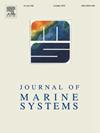An Informer-based prediction model for extensive spatiotemporal prediction of sea surface temperature and marine heatwave in Bohai Sea
IF 2.5
3区 地球科学
Q2 GEOSCIENCES, MULTIDISCIPLINARY
引用次数: 0
Abstract
Marine heatwaves (MHWs) are prolonged events of extreme sea surface temperature (SST) that have adverse effects on marine ecosystems and socio-economic aspects. Therefore, accurately and effectively predicting SST and MHW events in advance is crucial for mitigating their adverse effects. However, prediction of extreme events over the long term remains a significant challenge. In this study, we apply a deep-learning technique based on Informer, combined with the Empirical Orthogonal Function (EOF) and Empirical Mode Decomposition (EMD), named EOF-EMD-Informer, to improve the prediction of MHWs' occurrence on spatiotemporal scales. Extensive experiments in the Bohai Sea, based on daily satellite-observed SST, shows that the proposed Informer-based model outperforms recurrent neural networks and their variants in medium-term prediction of SST and MHWs' occurrence. The model performs well in predictions up to 30 days ahead, with a root mean square error of about 0.96 °C and an F1 score of about 0.93. About 51 % of the spatial grids have a root mean square error smaller than 0.55 °C with EOF-EMD-Informer model, representing an improvement of approximately 5 % and 27 % compared to the EMD-Informer and Informer models, respectively. This study serves as a proof of concept, demonstrating the potential applications of Informer-based methods in medium-term (up to at least 30 days) predictions of daily SST and MHWs and highlighting their effectiveness in extensive spatiotemporal predictions.
基于informer的渤海海温与海洋热浪大范围时空预报模型
海洋热浪(MHWs)是极端海表温度(SST)的长期事件,对海洋生态系统和社会经济方面具有不利影响。因此,准确有效地提前预测海温和MHW事件对于减轻其不利影响至关重要。然而,对极端事件的长期预测仍然是一项重大挑战。在本研究中,我们将基于Informer的深度学习技术,结合经验正交函数(EOF)和经验模态分解(EMD),将其命名为EOF-EMD-Informer,以改进在时空尺度上对mhw发生的预测。基于每日卫星观测的渤海海温的大量实验表明,基于informer的模型在中期预测海温和海温发生方面优于递归神经网络及其变体。该模型在未来30天的预测中表现良好,均方根误差约为0.96°C, F1分数约为0.93。使用EOF-EMD-Informer模型,约51%的空间网格的均方根误差小于0.55°C,与EMD-Informer模型和Informer模型相比,分别提高了约5%和27%。本研究作为概念验证,展示了基于informer的方法在中期(至少30天)每日海温和海温预报中的潜在应用,并强调了它们在广泛的时空预测中的有效性。
本文章由计算机程序翻译,如有差异,请以英文原文为准。
求助全文
约1分钟内获得全文
求助全文
来源期刊

Journal of Marine Systems
地学-地球科学综合
CiteScore
6.20
自引率
3.60%
发文量
81
审稿时长
6 months
期刊介绍:
The Journal of Marine Systems provides a medium for interdisciplinary exchange between physical, chemical and biological oceanographers and marine geologists. The journal welcomes original research papers and review articles. Preference will be given to interdisciplinary approaches to marine systems.
 求助内容:
求助内容: 应助结果提醒方式:
应助结果提醒方式:


